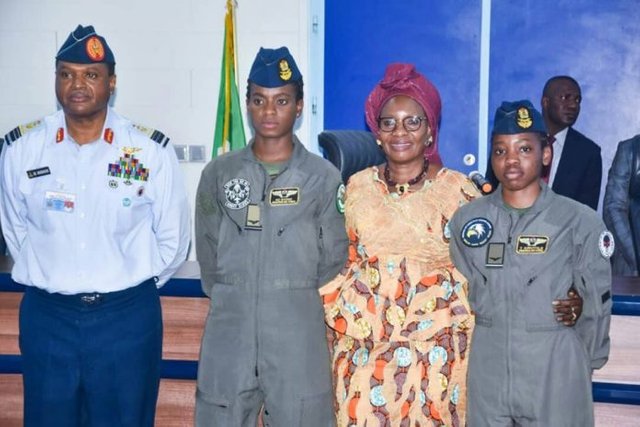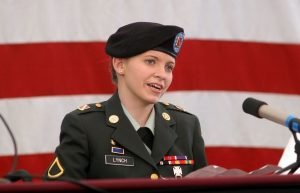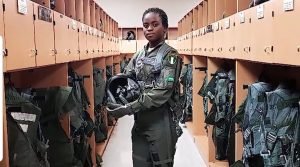Kafayat Sanni and Tolulope Arotile in the Rational World of Defense Intellectuals of the Nigerian Air Force

It is not clear why the Nigerian Air Force, (NAF) did not organise a much, more elaborate celebration of its winging of the first female combat pilot and first female helicopter pilot on October 15th, 2019. Except if it pleads its involvement in containing the generalised insecurity and the counter-insurgency operation against Boko Haram as the reason, the making of the female officers is the stuff of exceptionalism. This is not only because such symbolic moments are the glue that binds a nation, it is also because an African Air Force has made a grand and progressive entry into a historical controversy in international security. Historically, the debate has been on: can we give women the guns?

No country in the world has settled the debate. Many are but managing it but it remains. When American troops rescued Jessica Lynch in a Rambo style military operation in April 2003 in Iraq, the controversy deepened, attracting attention on this issue of suitability of women for military service. In spite of the controversy that trailed the contending narratives of her travails, her being taken a Prisoner of War, (POW) has raised questions. Was her capture the conclusive evidence of the unsuitability of women as soldiers because of perceived extra vulnerability or was it the conclusive evidence that women too can die for their country in the same way that men soldiers do?
Implying extra vulnerability to capture is what some of her conscious and unconscious defenders have not taken lightly. They hit back by asking if it is only women who are taken Prisoners of War. After all, a disputed number of men died in the ambush in which Lynch was captured. But the question was made more complicated by what she said when she was interviewed after her rescue. It was just one of the many things she said and which was expressing the desire to be a home maker too, like most other women. Some sociologists argue that that desire was too much of what an average woman would say, implying the difficulty of converting women into violent warriors.

Dr. Carol Cohn whose article is available as a free download on the internet
From Lynch to Cohn. Published in 1987 for example, Carol Cohn’s paper “Sex and Death in the Rational World of Defence Intellectuals” is still a recommended text in Gender and International Security. This happens because no text has provided as much elaborate details of the sexual imagination even in morbid domains as nuclear warfare as her paper. Finding herself in the world of practitioners of nuclear strategy, she couldn’t believe the degree of the phallic imagination of that deadly enterprise. She was perplexed by the possibility of the sexual sub-text of nuclear-speak or what she call ‘technostrategic’. Not so much by the cold bloodedness of these otherwise great guys but that “there was no evidence that any feminist critiques had ever reached the ears, much less the minds of these men”
This is why the NAF would have been justified to even organise a seminar on the import of Kafayat Sanni and Tolulope Arotile’s becoming. The import is that the force has been able to say yes and loudly too that it ‘can give women the guns’. By doing so to, it is contributing seriously to an issue that remains as complicated as ever, given the contentions around the question.

Kafayat Sanni

Tolulope Arotile
One argument is that it will be a classic case of exclusionary practice if women are not given the guns because they are half the population. The other position is how dangerous it would be to suggest that women are incapable of the heroism of dying for one’s country which is what soldiering boils down to. These are the sort of positions advanced by agitators for enlisting women into the military.
There are the contending positions, which are no less logical. If the military exists to protect everyone, especially women and children, why is it important to include women again? That is one position. There is a second. It points at the contradiction of insisting on women combatants when women are supposed to be pro-peace, calm and against the kind of violence military norms permit.
Good or bad, right or wrong, women are on the move in military professionalism. The process is irreversible. But that is not to forget that the military is arriving at that over a long period of struggle against exclusion of women. The military hierarchy across the world has had to come to grips with the reality. There is, therefore, something for everybody in Kafayat Sanni and Tolulope Arotile’s becoming – something positive for Nigeria’s image, for equalitarian agitators in gender terms, for the NAF and for modernity.
Posted from my blog with SteemPress : https://intervention.ng/17831/